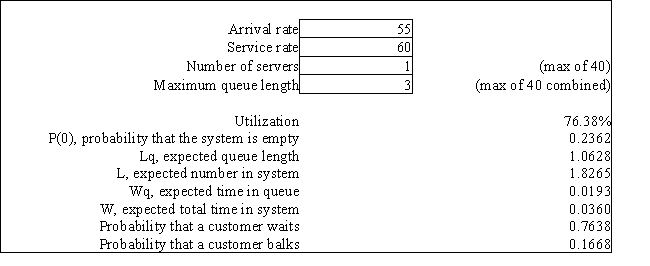Exhibit 13.5
The following questions refer to the information and output below.
A computer printer in a large administrative office has a printer buffer (memory to store printing jobs) capacity of 3 jobs. If the buffer is full when a user wants to print a file the user is told that the job cannot be printed and to try again later. There are so many users in this office that we can assume that there is an infinite calling population. Jobs arrive at the printer at a Poisson rate of 55 jobs per hour and take an average of 1 minute to print. Printing times are exponentially distributed. The following queuing analysis spreadsheet was developed from this information. 
-Refer to Exhibit 13.5. Based on this report how long does a computer user have to wait for his/her job to be completed?
Definitions:
Just-World Phenomenon
The cognitive bias to believe that the world is just and people get what they deserve, leading to a tendency to blame victims for their misfortune.
Other-Race Effect
A phenomenon in which individuals are better at recognizing faces of their own race than those of other races.
Scapegoat Theory
A psychological concept suggesting that individuals or groups blame their problems and failures on others instead of accepting responsibility.
Outgroup
A social group to which an individual does not identify or belong, often viewed less favorably than the ingroup.
Q8: Refer to Exhibit 15.4. The following spreadsheet
Q22: In order for an incident of stalking
Q36: Refer to Exhibit 10.1. Based on the
Q37: _ is a means of conflict resolution
Q43: Assume you have chosen to use all
Q71: Refer to Exhibit 11.25. What is the
Q72: Refer to Exhibit 11.24. What is the
Q78: If we are employing Activity-On-Node (AON) network
Q97: Refer to Exhibit 11.13. What formulas should
Q123: Refer to Exhibit 11.11. What formula should